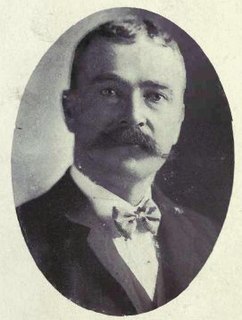James William Armstrong (January 14, 1860 [1] —February 26, 1928 [2] ) was a politician in Manitoba, Canada. He served in the Legislative Assembly of Manitoba from 1907 to 1922 as a member of the Liberal Party, and was a cabinet minister in the government of Tobias Norris.

Manitoba is a province at the longitudinal centre of Canada. It is often considered one of the three prairie provinces and is Canada's fifth-most populous province with its estimated 1.3 million people. Manitoba covers 649,950 square kilometres (250,900 sq mi) with a widely varied landscape, stretching from the northern oceanic coastline to the southern border with the United States. The province is bordered by the provinces of Ontario to the east and Saskatchewan to the west, the territories of Nunavut to the north, and Northwest Territories to the northwest, and the U.S. states of North Dakota and Minnesota to the south.

Canada is a country in the northern part of North America. Its ten provinces and three territories extend from the Atlantic to the Pacific and northward into the Arctic Ocean, covering 9.98 million square kilometres, making it the world's second-largest country by total area. Canada's southern border with the United States is the world's longest bi-national land border. Its capital is Ottawa, and its three largest metropolitan areas are Toronto, Montreal, and Vancouver. As a whole, Canada is sparsely populated, the majority of its land area being dominated by forest and tundra. Consequently, its population is highly urbanized, with over 80 percent of its inhabitants concentrated in large and medium-sized cities, many near the southern border. Canada's climate varies widely across its vast area, ranging from arctic weather in the north, to hot summers in the southern regions, with four distinct seasons.

The Legislative Assembly of Manitoba and the Queen of Canada in Right of Manitoba, represented by the Lieutenant Governor of Manitoba form the legislature of the Canadian province of Manitoba. Fifty-seven members are elected to this assembly in provincial general elections, all in single-member constituencies with first-past-the-post voting. The Manitoba Legislative Building is located in central Winnipeg, at the meeting point of the Wolseley and Fort Rouge constituencies.
Armstrong was born in Kingston, Nova Scotia, the son of James Armstrong and Elizabeth Pearce, [2] both Baptists of loyalist descent. [3] He was educated at the Pictou Academy, Acadia College, the Manitoba Medical College, and King's College Hospital in London, UK. He received a Bachelor of Arts degree from Acadia, and medical certification from the MMC. Armstrong worked as a physician and surgeon, and was also president and director of the Gladstone Telephone and Electric Light Company. He served as district health officer and was a member of the Manitoba Board of Health from 1897 to 1899. In 1897, Armstrong married Mary Campbell. [2]

Kingston is a Canadian village in Kings County on the north bank of the Annapolis River in the Annapolis Valley of Nova Scotia, Canada. As of 2016, the population was 3,093.

Nova Scotia is one of Canada's three Maritime Provinces, and one of the four provinces that form Atlantic Canada. Its provincial capital is Halifax. Nova Scotia is the second-smallest of Canada's ten provinces, with an area of 55,284 square kilometres (21,300 sq mi), including Cape Breton and another 3,800 coastal islands. As of 2016, the population was 923,598. Nova Scotia is Canada's second-most-densely populated province, after Prince Edward Island, with 17.4 inhabitants per square kilometre (45/sq mi).

United Empire Loyalists is an honorific which was first given by the 1st Lord Dorchester, the Governor of Quebec, and Governor-General of the Canadas, to American Loyalists who resettled in British North America during or after the American Revolution. The Loyalists were also referred to informally as the "King's Loyal Americans". At the time, the demonym Canadian or Canadien was used to refer to the indigenous First Nations groups and the French settlers inhabiting the Province of Quebec.
He was first elected to the Manitoba legislature in the 1907 provincial election, defeating Conservative incumbent David Wilson by 61 votes in the constituency of Gladstone. He was re-elected by an increased margin in the 1910 election, and again in the election of 1914. [1]
The Progressive Conservative Party of Manitoba is a right-of-centre political party in Manitoba, Canada and the only right-leaning party in the province. It is currently the governing party in the Legislative Assembly of Manitoba, after winning a substantial majority in the 2016 provincial election.
David Wilson was an Irish-born rancher, financial agent and political figure in Manitoba. He represented Gladstone from 1903 to 1907 in the Legislative Assembly of Manitoba as a Conservative.
The Conservative administration of Rodmond Roblin, which had governed Manitoba since 1900, was forced to resign from office in early 1915 as the result of a corruption scandal. [4] Although the Liberals held a minority of seats in the legislature, they were called on by the province's Lieutenant Governor to form a new government. Armstrong was appointed to Premier Norris's first cabinet on May 12, 1915, as Provincial Secretary and Municipal Commissioner. Armstrong was then re-elected by a landslide in the 1915 provincial election, in which the Liberals won 40 seats out of 47. He was retained in his cabinet portfolios after the election. [1]

Sir Rodmond Palen Roblin, was a businessman and politician in Manitoba, Canada.
The position of Provincial Secretary was particularly important in Manitoba from 1870 to 1874, as that province's institutions were being established. The province had no Premier during this period, and its Lieutenant-Governor acted as the de facto leaders of government. The early Provincial Secretaries were the most prominent elected officials in the province, and are retrospectively regarded as Premiers in many modern sources.
The office of the Municipal Commissioner is a former government department in the Canadian province of Manitoba, established by the government of John Norquay in 1887. The government of Douglas Campbell restructured the department as the Ministry of Municipal Affairs in 1953, after taking on increased responsibilities.
The Liberals were reduced to a minority government in the 1920 provincial election. Armstrong defeated Farmer candidate Wesley Lobb by 180 votes, and was retained in office after the election. He chose not to run again in 1922. [2]
A minority government, or minority cabinet or minority parliament, is a cabinet formed in a parliamentary system when a political party or coalition of parties does not have a majority of overall seats in the parliament. It is sworn into office, with or without the formal support of other parties, to enable a government to be formed. Under such a government, legislation can only be passed with the support of enough other members of the legislature to provide a majority, encouraging multi-partisanship. In bicameral parliaments, the term relates to the situation in chamber whose confidence is considered most crucial to the continuance in office of the government.
Armstrong died in Winnipeg at the age of 68 [2] after suffering a stroke. [3]

A stroke is a medical condition in which poor blood flow to the brain results in cell death. There are two main types of stroke: ischemic, due to lack of blood flow, and hemorrhagic, due to bleeding. Both result in parts of the brain not functioning properly. Signs and symptoms of a stroke may include an inability to move or feel on one side of the body, problems understanding or speaking, dizziness, or loss of vision to one side. Signs and symptoms often appear soon after the stroke has occurred. If symptoms last less than one or two hours it is known as a transient ischemic attack (TIA) or mini-stroke. A hemorrhagic stroke may also be associated with a severe headache. The symptoms of a stroke can be permanent. Long-term complications may include pneumonia or loss of bladder control.



